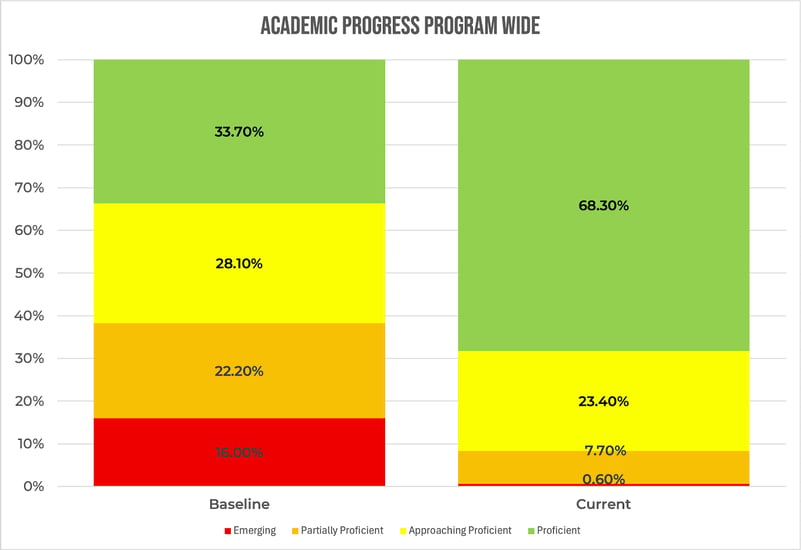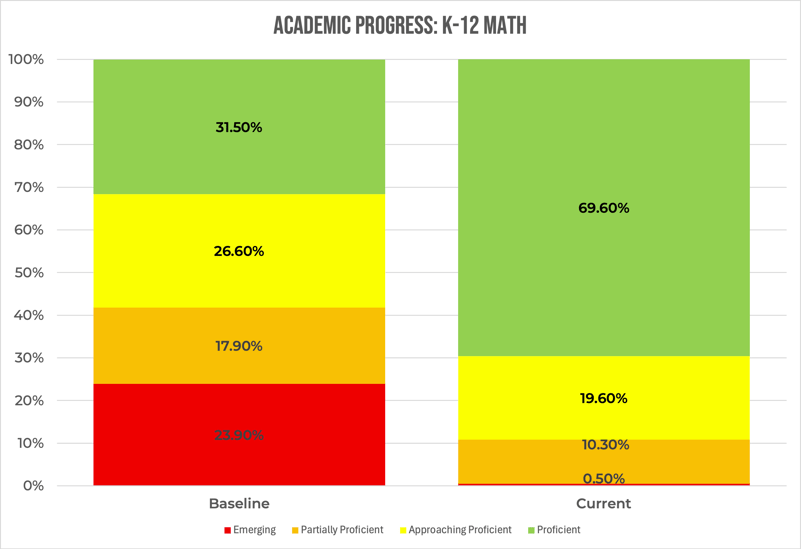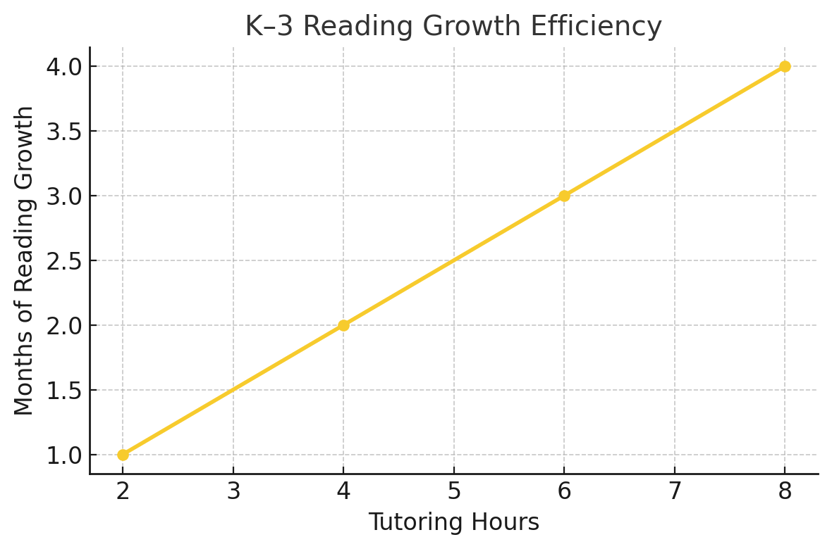Special Education Tutoring for Parentally Placed Private School Students ('24-25 Program Results)
My son’s Cignition tutor was amazing. She helped him with math tutoring and often even with his specific math homework. He has been thriving in math. I was wary of the remote learning aspect, but it was great. It was extremely convenient and engaged my son.
-
Students demonstrated an average of 45.8% academic growth1 across subjects, based on pre- and post-program mastery checks.
-
Math mastery increased by 56%, while ELA mastery increased by 33.5%2.
-
96.6% of students reported being challenged in meaningful ways that encouraged persistence and deeper engagement—an essential component of productive struggle and long-term learning.
- K-3 students gained one month of reading proficiency for every 2.1 hours of tutoring, equivalent to one month of growth for every four sessions.
Expanding a Successful Partnership
For the past three years, Cignition has supported students across a large, multi-site education system through targeted tutoring initiatives. This work informed a new initiative launched in the 2024–2025 school year to provide at-home tutoring for K–12 students with disabilities attending private schools.
This initiative focused on delivering high-dosage, at-home tutoring to K–12 students with disabilities attending private schools. Students received small-group instruction in ELA, math, and executive functioning, led by certified special education teachers with experience in differentiated instruction.
Year-one results indicate that this model has strong potential to drive meaningful academic growth for students with disabilities when implemented with fidelity.
Program Design: Meeting Students Where They Are
Unlike many district-based tutoring programs, this initiative served a widely dispersed student population. Students enrolled in the program were placed in private schools by their families and did not attend centralized district campuses. Cignition delivered all tutoring virtually to address this challenge, offering flexible, at-home support.
Tutoring was delivered in small groups over a 20-week program. Groupings were created based on grade level, subject area, and initial diagnostic data to ensure instructional alignment. Each tutor held special education certification or deep expertise in content areas such as foundational literacy and executive functioning.
Instruction was offered in math, ELA, and executive functioning, with students averaging 15.5 hours of live tutoring throughout the program. The virtual format made it possible to build groups across school sites while allowing families to schedule sessions around their availability. This structure provided consistency, personalization, and instructional alignment, without requiring students to travel or log in during school hours.
Instructional Model and Progress Tracking
The academic content was structured around mastery-based instructional design. Students completed an initial diagnostic followed by ongoing mastery checks, allowing tutors to monitor learning in real time and adjust instruction accordingly.
Academic growth was calculated based on a three-point mastery rubric:
- Providing a correct answer
- Supporting answers with evidence (for ELA)
- Explaining thought processes clearly
Students who consistently demonstrated all three criteria were considered “Proficient.” Those who met two were rated “Approaching Proficient,” and so on. This transparent framework helped tutors and students understand learning targets and monitor real-time progress.
Academic growth was measured by comparing baseline and final mastery levels. By the end of the program, students demonstrated an average of 45.8% academic growth across subjects, with math and early literacy showing robust gains. These outcomes reflect the impact of consistent tutoring and the benefit of grouping students by skill level, allowing instruction to stay closely aligned with student needs.

Engagement Through Parent Partnership
Because this program was opt-in, successful implementation depended heavily on family collaboration. Cignition worked closely with parents and caregivers throughout the onboarding process—coordinating session times, clarifying expectations, and helping troubleshoot any logistical challenges related to online learning.
Parents weren’t just passive participants; they were active partners. They communicated directly with program managers, received regular updates on progress, and had ongoing opportunities to provide feedback. This two-way communication helped build trust, reduced attrition, and ensured that instructional goals were reinforced at home.
The results were decisive: parents frequently reported growth in academic confidence, increased willingness to engage with learning at home, and improved communication skills in their children. Many reached out independently to continue tutoring after the official program window closed, signaling an overall satisfaction with both instructional quality and overall experience.
Students echoed this positive sentiment. Based on end-of-program surveys:
.png?width=1157&height=550&name=Student%20Feedback%20Shows%20Exceptional%20Engagement%20and%20Learning%20Confidence%20(Updated).png)
Don’t just take our word for it—or even the survey data—as the whole story. Below, you’ll find quotes from actual parents whose children participated in the program, sharing firsthand what they appreciated most and the impact they saw in their students.
My son is now able to read! Having a patient tutor who was able to find a way to break down how to differentiate letters and sounds so my son could read stories was incredibly valuable.
I can sense their confidence in reading out loud. They are finding new ways to understand what they've just read. The tutor's method of instruction and ability to hold their attention has been a big part of their success.
The difference between the beginning and end of the program is remarkable, both in what she knows and in her confidence. Thank you all so much! We're so grateful for this program.
The personalized plan and consistency made all the difference in getting my son where he needs to be. I was skeptical about the online component, but the tutor does a great job of keeping him focused throughout the session.
My child has been more willing to learn. His math skills have rapidly increased in this amount of time, and he is a more critical thinker. There's been so much upside in the one-on-one time with the tutor.
Both my kids benefited from this program. My son went from an F in 7th grade to an A—, and my daughter will be better prepared for Algebra 2 next year. Thank you so much!
There has been such a difference in Adrian’s math skills since the start of this tutoring. He went from needing direct help with math homework daily to completing his math homework independently most days. We hope this program continues.
The program helped Lorenzo in many ways and was invaluable to us. Tutors were accommodating with our schedule and engaged in the session.
My son was very comfortable with his tutor. The comments at the end were very helpful for us parents because we got to see how our child accomplished whatever activity they worked on for the session. Every week, there seemed to be an improvement.
Outcomes and Literacy Gains
Student growth was evident across both core content areas—math and ELA—with particularly strong outcomes in foundational literacy for early learners. In math, students demonstrated a 56.0% average growth score based on pre- and post-program mastery assessments, reflecting significant skill acquisition throughout the program.

Gains in ELA were also meaningful, with early grade students showing steady progression and a growing percentage of learners reaching higher mastery tiers.
Reading gains were especially strong among younger learners in grades K–3. Students in this group averaged one month of reading proficiency for every 2.1 hours of instruction, equating to nearly a full month of growth for every four tutoring sessions.
This level of progress speaks to the program’s strong foundational approach and tutors' expertise in building early literacy skills. Parents also reported that their children showed greater confidence when reading aloud at home and were more willing to engage with books independently.

Implementation Insights and Scalability
As with any pilot initiative, this program offered valuable insights into how to improve both delivery and scalability in future iterations:
- Scheduling and availability: Students came from dozens of schools, each with unique schedules. Future rollouts will benefit from earlier group matching and more structured session planning.
- Instructional calibration: Tutors and program managers worked together to refine groupings over time, ensuring that instruction stayed aligned to students' readiness levels.
- Parent communication: Clearer expectations about group formats, session structure, and academic pacing will support even stronger engagement and outcomes moving forward.
Despite these challenges, the program delivered consistent, high-quality instruction to a diverse student population. Ongoing collaboration between tutors, program managers, and families proved essential to its success.
Conclusion
The results from this special education tutoring initiative indicate a clear takeaway: when implemented with fidelity, high-dosage tutoring can accelerate academic growth and build student confidence, even among populations facing significant instructional barriers.
With the proper structure, staffing, and support systems in place, this model is highly scalable. Whether delivered in person, online, or in a hybrid format, it offers a blueprint for expanding access to personalized instruction for students with disabilities.
Click below to explore the full data summary and uncover deeper insights into student progress, engagement, and impact.
1A Progress Growth Score shows how much a student improved relative to where they started. It is calculated by subtracting the baseline score from the most recent score and dividing that number by the baseline. In this program, the average baseline score was 59%, and the final score was 86%, resulting in a 27-point gain. Dividing 27 by 59 yields a Progress Growth Score of 45.8%.
2 Growth scores for math and ELA were calculated using the abovementioned method. For example, a student who improved from 50% to 78% in math would have a growth score of 56%, representing progress relative to their starting point.
Impact Your Students Today
Cignition's pool of expert math tutors are ready to help your students succeed, inside and outside of school time. Learn more about incorporating Cignition tutors into your classroom and after school programs